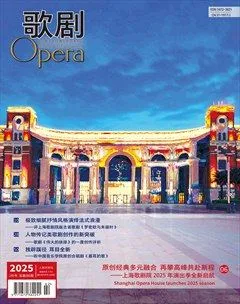通過線上分享的原創韓國歌劇
小瓊:我花了整個年末假期,像追劇般在線觀看各類文化節目!沒有什么比擁有幾天屬于自己的時間,在舒適的家中挑選最好的歌劇來觀看更美好的事了!
小薇:事實上,中國的國家大劇院已經面向全國上傳了一個免費的視頻庫,節目種類豐富,從歌劇、舞劇到音樂會,數百小時的高品質演出觸手可及。
小瓊:我剛剛從幾年前我在本專欄中提到過的一個熟悉的網站上有所發現。還記得“歌劇視野”嗎?
小薇:那是由歐盟“創意歐洲計劃”資助的、由專注于歐洲歌劇院和藝術節的專業協會機構Opera Europa建立的免費流媒體平臺。這個網站提供了許多來自其成員機構的歌劇和芭蕾舞劇視頻。
小瓊:不僅限于此。他們偶爾還會提供歐洲以外的歌劇院的節目!不久前東京新國立劇場在該網站上分享了日本歌劇與舞劇制作,目前是大邱歌劇院制作的《264:一顆星》。這部由金成宰作曲的劇目將持續上線到今年6月中旬。
小薇:多么不尋常的標題……這是一部怎樣的作品?

小瓊:這是一部用韓語演唱的原創歌劇,講述了他們的革命英雄李源祿(1904—1944)的一生。李源祿是一位韓國詩人和愛國者,在20世紀初與日本侵略者進行了斗爭。在很多方面,我可以看到這部歌劇的主題與不少近期制作的中國原創及民族歌劇之間的相似之處。它們突出了國家歷史上的重要時刻,并激勵了本國民眾。
小薇:1944年,李源祿死于日本侵略者的酷刑之下,那正是一個世界歷史的動蕩時期。但在演員名單上,我看到主角李源祿由多達三名的演員分飾。多么有趣的藝術設計啊!
小瓊:兩位男高音歌唱家分別飾演“士兵”李源祿和“丈夫”李源祿,一位男中音歌唱家飾演“詩人”李源祿。作品對李源祿自身及他的行為和信念進行更深入的心理研究,但它也有助于有效地講故事,方便編劇運用回憶和快進時適應倒敘的手法。
小薇:我快速瀏覽了一下這段歌劇視頻。演唱和管弦樂演奏的質量都非常高。當我在春節假期有更多時間的時候,我會看完整部歌劇!

Joan: I spent the holidays catching up on many cultural offerings that are available to watch online! Nothing beats having a few days to yourself, picking the best operas to watch in the comfort of your own home!
Valery: Indeed, China’s National Centre for the Performing Arts (NCPA) has already produced such a treasure trove of free videos, from operas and dance dramas to concerts for everyone in the country. Hundreds of hours of high-quality performances are easily reachable on the tips of our fingers.
Joan: I just made a discovery from a familiar website I’d mentioned in this column several years ago. Remember OperaVision?
Valery: That’s the free streaming platform funded by the European Union’s Creative Europe program (www. operavision.eu) and established by Opera Europa, the professional association of European opera houses and festivals. This website offers so many opera and ballet productions from its member institutions.
Joan: But there’s more. Once in a while they offer programs from opera houses outside of Europe! Not long ago, the New National Theatre Tokyo shared its productions on the website, and currently is Daegu Opera House’s 264, That One Star by composer Kim Sungjae, which is running until the middle of June.
Valery: What an unusual title…what is it about?
Joan: It’s a national opera—sung in Korean—tracing the life of their revolutionary hero Yi Won-rok(1904?1944), a poet and patriot who fought against the Japanese occupiers in the early part of the 20th century. In many ways, I can see similarities between the subject of this opera and recent Chinese national operas. They highlight important moments in history and inspire the audience.
Valery: Yi died under torture of the Japanese in 1944, a tumultuous period in world history. But on the cast list, I see the leading character—Yi Won-rok—is played by three actors. What an interesting artistic device!
Joan: Two tenors play Yi the soldier and Yi the husband, while a baritone plays him as a poet. It allows for a deeper psychological study of the man, his actions and his beliefs. But it also makes for effective storytelling, accommodating flashbacks as the story rewinds and fast-forwards the narrative.
Valery: I’ve had a quick look at this opera video. The quality of the singing as well as orchestral playing is very high. When I have more time during Spring Festival, I’ll watch the entire opera!

